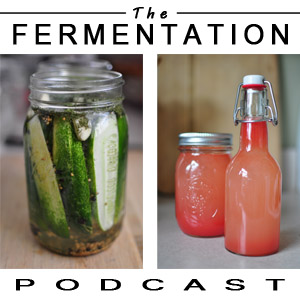Today’s “Fermentation in the News” covers some of the topics or issues I’ve come across on my search to update you with what’s going on in the world of fermentation. These stories can come from varied sources including newspapers, television, blogs, or videos and include fermentation related stories, a new recipe I might find interesting, or even health related involving fermentation.
You’ll have to tell me what you guys think and if you have any interesting news that you think should be included, I want to know about it!
Fermentation Businesses
Fine Feathers Kombucha Establishes Brick-and-Mortar in Central Long Beach
(Long Beach Post)
“Our business model isn’t a typical business model—we just want to create a community.”
It is safe to say that almost two years ago, wife and husband team Jodine Penev West and Jay Penev introduced Long Beach to kombucha through their Fine Feathers brand.
Kickstarter: Kraut Source – Made Simple
(Kickstarter)
Gourmet Fermentation in a Mason Jar. Create delicious, nutritious fermented foods at home.
Kraut Source is Mason jar kitchenware for making fermented foods like sauerkraut, natural pickles, kimchi, kefir, and more. It’s stainless steel, dishwasher safe, and easy to use.
If you are already buying live-culture fermented foods, you know how expensive that can get. Kraut Source encourages the DIY, artisanal spirit by enabling home chefs to create gourmet fermented foods, economically.
Kraut Source is designed for singles and families of all sizes. It fits on wide-mouth Mason jars, so you can make pint, quart, or 2-quart size batches. It takes up little space, so you can have several batches going at the same time. Its elegant, streamlined design means that it will look really nifty on your counter top.
Food & Drink News
Unlocking France’s Secrets To Safer Raw Milk Cheese
(NPR)
In the English-speaking world, our approach to making cheese for most of the last 60 years has been like a Texas gunslinger’s: kill bacteria, ask questions later. If it’s not pasteurized, it’s dangerous, the thinking goes.
But in France, raw milk cheese is a very big deal, long considered safe and revered for its flavor. The country cultivates its 350-plus cheeses — many of which are made with raw milk — like children, claiming that the bacteria in the raw milk impart unique characteristics – grassy, metallic, buttery and so on.
The ancient art of terracotta-fermented wines gets new life in Oregon: Wine Notes
(The Oregonian)
For most of us, the sight of a wine cellar laden with wooden barrels is a charming reminder that some traditions are timeless. But for devotees of “natural wine” (the oenophile’s version of the Slow Food movement), bent-oak barrel staves represent a relatively recent blip on the winemaking timeline.
The what’s-old-is-new-again fad in food and beverage has, in winemaking, delved deep into antiquity in recent years, as winemakers all over the world have begun experimenting with clay vessels, very like the amphorae used by the ancient Greeks, Phoenicians and Romans.
Kombucha craze: A miracle tea?
(News 4 Jax)
The internet is scattered with photos of Lindsay Lohan toting a bottle of a nationally marketed brand of Kombucha, and other celebrities like Madonna, Gwyneth Paltrow and Halle Berry apparently can’t get enough of it.
In the past few years, two Kombucha brewing businesses have set up shop in Central Florida.
Foods we only eat when they’re rotten
(Fox News)
We tend to go through life thinking that if something is rotten, it’s a sign that it’s time to throw it out. But in fact, food that’s begun to rot is eaten all around the world, and you most likely eat it as well.
Obviously, it’s not exactly appealing to call food out as being rotten, so there’s a more common term for it: fermented. Fermentation simply means giving bacteria time to do their thing; if it’s bad bacteria you can end up with food poisoning, but if it’s good bacteria you end up with pickles.
Kombucha cha-ching: A probiotic tea fizzes up strong growth
(CNBC)
Daina Trout spent months brainstorming about the right product for the business that she, her husband Justin Trout and best friend Vanessa Dew wanted to launch. Their liquid sustenance during those all-night sessions was kombucha tea, a fermented effervescent drink that Daina had been brewing at home for a decade. And then it finally hit them: “We’d been guzzling the answer all along,” she said.
Punch up your plate: take some relish in pickled goodies
(The Grand Island Independent)
If you’re looking to punch up your plate, reach for a relish. We’re not talking limp bits of oversweet pickles from a jar but rather the zippy, tangy, pungent and otherwise palate-rocking flavors of freshly made, bold, ethnic relishes such as Korean kimchee, Indian chutney and German sauerkraut.
Why You Should Be Making Pickles With Your Kids
(Slate)
This column has tried to make the point that kids often eat things we don’t think kids eat. It has made this point with the subtlety of a cleaver. Anchovies, for example. Also, sometimes, liver.
We tend to think of children as shy eaters. But a lot of the time children like things with an extravagance of taste. (Not all children, and not all the time; my children may or may not be currently eating sticks of butter for snack.) To the list above—anchovies and liver, not to mention sardines and miso—we should add: Things That Are Pickled.
Health & Science News
Our Microbiome May Be Looking Out for Itself
(The New York Times)
Your body is home to about 100 trillion bacteria and other microbes, collectively known as your microbiome. Naturalists first became aware of our invisible lodgers in the 1600s, but it wasn’t until the past few years that we’ve become really familiar with them.
This recent research has given the microbiome a cuddly kind of fame. We’ve come to appreciate how beneficial our microbes are — breaking down our food, fighting off infections and nurturing our immune system. It’s a lovely, invisible garden we should be tending for our own well-being.
FOOD FAD: Gut bacteria manipulate brain
(The Himalayan Times)
Cannot resist those fatty foods even though you wish to trim down? It could be because of the bacteria living with you that can manipulate your brain to eat what they want to feed on, suggests a study.
Are we food zombies controlled by our gut bacteria?
(CNET)
A new study says the bugs growing in our digestive tract might steer us to choose the foods that are best for them, even if they’re not best for us.
Kalskag man dies after eating fermented fish
(Alaska Dispatch News)
A man from Lower Kalskag who became sick after eating fermented fish was found dead in his home Friday, Alaska State Troopers reported Sunday evening.
My notes – be safe fermenting out there! Especially with meats.
Use of probiotics and prebiotics may change bacteria metabolism and slow or reverse disease
(The Raw Food World)
A new study shows that bacteria in the mouth act differently when the human body is diseased. This research may lead to better ways to prevent or even reverse the gum disease periodontitis, diabetes, and Crohn’s disease.
Bacteria that aid in digestion aid in keeping intestinal lining intact
(Food & Beverage News)
Scientists at Albert Einstein College of Medicine of Yeshiva University have found that bacteria that aid in digestion help keep the intestinal lining intact. The findings, reported online in the journal Immunity, could yield new therapies for inflammatory bowel disease (IBD) and a wide range of other disorders.
Monitoring the rise and fall of the microbiome
(Imperial Valley News)
Trillions of bacteria live in each person’s digestive tract. Scientists believe that some of these bacteria help digest food and stave off harmful infections, but their role in human health is not well understood.
To help shed light on the role of these bacteria, a team of researchers led by MIT associate professor Eric Alm recently tracked fluctuations in the bacterial populations of two research subjects over a full year. The findings, described in the July 25 issue of the journal Genome Biology, suggest that while these populations are fairly stable, they undergo daily fluctuations in response to changes in diet and other factors.
Q&A: Scientist Studied His Poop for a Year to Learn About Gut Bugs
(National Geographic)
In the latest report from this inner frontier of science, Lawrence David, formerly a graduate student at the Massachusetts Institute of Technology, and his adviser, Eric Alm, tracked their own bodily functions—which largely meant studying their poop and pee—to see what might alter the colonies of bacteria that live in their guts.
They used cutting-edge DNA analysis and also perhaps the oldest health metric ever used by humans, studying their own feces. The results of their 2009-2010 adventure are published Thursday in the journal Genome Biology.
Gut Bacteria Appear To Live Parallel Lives To Our Own Inside The Digestive System
(Medical Daily)
For anyone who’s ever wondered whether microbes living within the digestive system live parallel lives to their human hosts, the answer is yes — and we know this because of smartphones.
Two study participants used smartphone apps every day for a year to meticulously record diet, exercise, bowel movements, and mood. They also submitted saliva and stool samples on a regular basis to allow analysis of how a person’s microbiota, the assortment of bacteria living within the body, adjusts to events here in middle space. Although scientists believe the individual composition of our microbiota affects health, the inner world of the human digestive system remains a bit murky.
Researchers develop sensing microbiosensor that detects beneficial bacteria in food
(News Medical)
In the food industry is very important to ensure the quality and safety of products consumed by the population to improve their properties and reduce foodborne illness. Therefore, a team of Mexican researchers developed a sensing microbiosensor that detects beneficial bacteria. This micromechanical device, which is known for being inexpensive, fast, selective and reliable, is the first of its kind manufactured in the country, and has been used to evaluate the growth of L. plantarum 299vm, a probiotic microorganism useful in the development of fermented dairy products.
The biosensor is able to monitor the growth of about 400 cells in just 30 minutes, compared with the traditional method that requires at least 24 hours of incubation.
Upcoming Events
Farm to Fermentation Festival
August 24th, 2014 11AM-5PM
(Santa Rosa, CA)
Fermentation Fest — A Live Culture Convergence
October 4-13, 2014
(Reedsburg, WI)
If you have a news item that you think I might find interesting or that might be a nice inclusion for next week’s Fermentation in the News, let me know! Either email me, click the Contact button on the top of the page, or comment below. I appreciate all feedback. Thanks so much!



